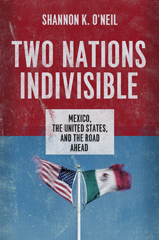
Two Nations, Indivisible
By Thursday Review staff | published Thursday, January 9, 2014 |
The border that separates the U.S. from Mexico is a notoriously troubled stretch of soil and river, and it has only gotten worse in the last few years. That two thousand mile stretch of fence and Rio Grande has given the country south of the border a bad rep, and Mexico's new president, Enrique Pena Nieto, hopes to begin a process of reform and transformation for a nation beleagured with bad press.
Last summer we reviewed in these pages the 2013 book by Jeb Bush and Clint Bolick, Immigration Wars, which—among its many salient points—suggested that the Republican Party’s setbacks in the election of 2012 were in part the result of a narrow and often unenlightened view of immigration. But this theme was really secondary to Bush and Bolick, for beyond the obvious political finger-pointing, the book’s most important point was that immigration, for the United States, is primarily an economic issue. And perhaps no country among the Americas—North or South—shares that global market pressure as closely and personally as the United States’ neighbor to the south, Mexico.
A new book by Shannon K. O’Neil, Two Nations Indivisible: Mexico, the United States, and the Road Ahead, takes this thesis to the next level, approaching the complex and often emotional issue of the immigration, borders and economic cooperation with care and precision. O’Neil understands that there is a media and press perception of a deeply troubled two thousand mile border, where chaos, lawlessness and violence seem to rise to new levels of horror with each passing news report.
But O’Neil suggests that these high-profile incidents are only a small part of the larger issues facing the two giant neighbors, and the constant narrative of drug lords, police corruption and illegal border crossings—and that of U.S. Border Patrol agents operating under a state of siege, day-in, day-out—clouds realities and inhibits progress between these nations.
Author (and past Columbia University instructor) O'Neil, a senior fellow for Latin America Studies at the Council on Foreign Relations, has researched and written extensively on Mexico, and her analysis has frequently appeared in magazines like Foreign Affairs and Foreign Policy, as well as in newspapers like the Washington Post. Her book reflects this nuanced and balanced approach to the relationship between the two democracies, as well as the economic view of two nations who need each other’s cooperation and shared adaptability if they are to remain competitive in a global economy.
O’Neil also attempts to tamp down much of the hyperbole surrounding the troubled border between Mexico and the U.S., and paints a larger canvas of Mexico as a thriving market and stable democracy, despite its reputation in the U.S. news media (and among many politicians) as lawless, hardscrabble frontier of drug wars, cartel violence and mass murder. This is expert and sober analysis on a subject which will ultimately affect the vitality and strength of two major world economies.
Read related articles at Thursday Review:
Immigration and the Human Dimension; R. Alan Clanton (book review of Immigration Wars: Forging an American Solution; Jeb Bush and Clint Bolick)
